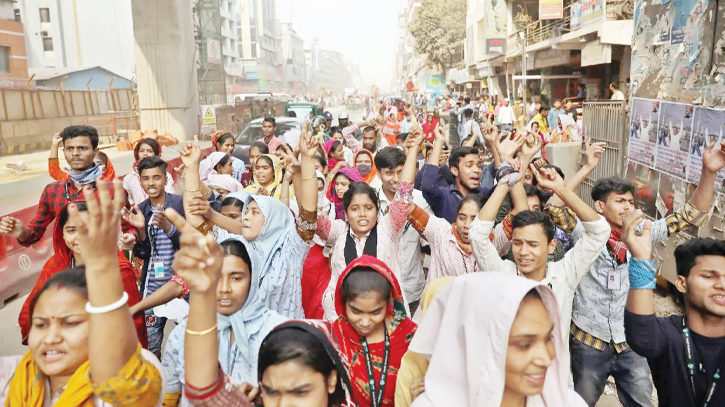
Photo: Messenger
The export sector, a major source of foreign currency for the country, is facing significant challenges as at least 15 ready-made garment (RMG) factories have announced closures for safety reasons amid escalating crisis conditions.
The industrial environment in the Savar-Ashulia area has become increasingly tense due to workers' protests demanding the halt of layoffs, payment of attendance bonuses, and accrued leave benefits.
Authorities have already declared the temporary closure of these factories to ensure safety amidst ongoing unrest. As a result, the country's export sector, which contributes significantly to foreign currency reserves, is expected to be adversely impacted.
This decline could further strain the nation’s reserves and exacerbate the ongoing dollar crisis, potentially affecting the import of essential commodities.
On September 1, workers from GAB Limited and nearby garment factories-initiated protests by blocking the Palashbari area of the Nabinagar-Chandra highway. They claimed that their reasonable demands were not addressed before the factory's closure was announced. The protests are set to continue until their grievances are resolved.
Bangladesh's garment sector, which currently earns about $45 billion annually from international markets, is crucial for bolstering national reserves. Industry experts warn that a worsening dollar crisis could severely disrupt the import of raw materials, affecting daily production.
The sector is already grappling with decreased export figures due to global political instability and domestic unrest. Exporters have requested low-interest loans to mitigate losses.
“The world economy's ongoing struggles and our country's political instability are drastically affecting our exports,” Muhammad Hatem, President of the Bangladesh Knitwear Manufacturers and Exporters Association (BKMEA), told the Daily Messenger.
Fazlee Shamim Ehsan, Vice President of BKMEA, highlighted that recent export figures reflect a troubling scenario. “We lack consistent gas and power supplies. This unrest will have a significant impact on the country's total exports,” the BKMEA vice president noted.
The Bangladesh Textile Mills Association (BTMA) President, Mohammad Ali Khokon, emphasized that both worker protests and the persistent gas crisis are major issues for the sector.
According to Export Promotion Bureau (EPB) data, the RMG sector experienced a 2.86 percent year-on-year increase, reaching $43.85 billion in earnings during the July-May period of FY24. However, home textile exports suffered a 24.29 percent decline, falling to $776.06 million from $1.02 billion during the same period last fiscal year.
In January to April of the previous fiscal year, the reserves were $32.22 billion in January, $32.26 billion in February, $31.14 billion in March, and $30.96 billion in April.
Worker demands vary by factory but commonly include payment of attendance bonuses and tiffin allowances, cessation of retrenchments, and dismissal of problematic officials. In the Snotex factory, dissatisfaction has arisen again related to recruitment issues.
At Nasha Group in Ghosh Bagh, Ashulia, workers protested for increased tiffin bills, attendance bonuses, and payment of accrued leave. The situation escalated when they attempted to block a road, leading to police intervention. The police used tear gas and batons to disperse the crowd, prompting the workers to retaliate by throwing bricks at nearby factories.
In response, authorities have closed several factories, including Ha-Meem Group and New Age, to ensure safety. The military has been deployed to manage the situation and order workers to disperse.
Superintendent of Police Mohammad Sarwar Alam of Ashulia Industrial Police-1 reported that protests are ongoing at Snowtex, Starling Group, NASA, Ha-Meem Group, Al-Muslim Apparels, and Acme Agrovet. To control the situation, a general holiday has been declared in at least 15 factories, and both industrial police and army personnel are present to prevent further incidents.
Messenger/Disha








